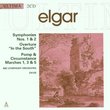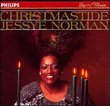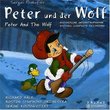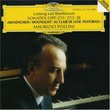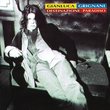Enchanting liturgical recreation of a late 17th century East
Sator | Sydney, Australia | 07/02/2005
(5 out of 5 stars)
"Anyone who has ever attended a Russian Orthodox Easter ceremony will know that its ecstatic celebratory moods differs strikingly from the Catholic or Protestant rituals, which are the darkest of the year. There are repeated exclamations by the Priest of 'Christ has arisen!' answered by enraptured congregation and choir alike with 'truly he has arisen!' Here Anatoly Grindenko reawakens lost traditions that disappeared at the start of the twentieth century. Grindenko has worked closely with musicologists who have painstakingly transcribed cryptic ancient notation to create workable performance editions. At the same time he has built up his Russian Patriachate Choir into a formidable choir of professional singers specialising in rediscovering a lost world.
The Office of Easter Night recorded here dates from the seventeenth century. While those who, like myself, have only the most passing familiarity with current Orthodox practice will recognise some of the chant here, the recreation here is more of the liturgical practice of the latter seventeenth century. The original manuscript is housed in the National Museum of Historic Russia. The chants were even notated in a previously unkown notation that required special deciphering. The main point of interest is that much of the music here is written in three parts, although even then the counterpoint is quite simple, similar to those found in the Western Ars Nova such as Perotin, rather than having the full on complexity of that of Renaissance composers such as Josquin or Palestrina. Another significant outside stylistic influence was in fact Greek Orthodox as there were frequent contacts between Russian and Greek Orthodox singers around the seventeenth century.
As usual from Grindenko, this is a wonderful recording of Orthodox chant, which recreates the elatory mood of the Orthodox Easter with his characteristic hynoptic intensity.
As for the totally bizarre assertion by Matthew Westphal that the part writing sounds like barbershop - well, I presume he thinks the Bach St Matthew Passion is German barbershop! It puzzles me why Amazon bother to get clueless editorialists to write unhelpful rubbish like this. I strongly suggest you listen to this enchanting CD and decide for yourself - you'll probably be totally bowled over. This recording is yet another triumph for Grindenko and his Russian Patriachate Choir who are clearly the leading practioners of Orthodox Chant today - HIGHLY recommended to anyone with any interest whatsoever in chant - or for that matter any Early Music.
Lastly, the liner notes are excellent, written by the musicologist Maria Bogomolova who deciphered the notation. The recording quality is as usual from Opus 111, first class. Thank you Yolanta Skura for making these revelatory recordings available!
"
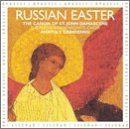

 Track Listings (35) - Disc #1
Track Listings (35) - Disc #1